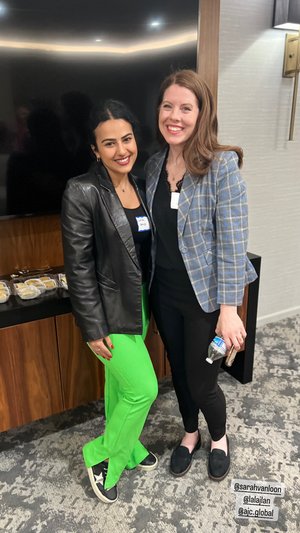Zaher Sahloul is a Critical Care specialist at Christ Advocate Medical Center in Chicago. Dr. Sahloul is the immediate past president of and a senior advisor to the Syrian American Medical Society (SAMS), a humanitarian and advocacy organization that provides medical relief to Syrians and Syrian refugees.
This story was recorded in partnership with MALA and StoryCorps. This story was produced by Hannah Barg from StoryCorps Chicago.
Dr. Sahloul came to the StoryCorps booth with MALA to share his experience as a Syrian American Muslim immigrant. He describes how his medical school classmate, Bashar al-Assad followed a rather different path from himself: one became a war criminal; the other, a humanitarian advocate.
“I was born in Algeria; my parents were elementary school teachers from Syria, who, during the post-independence period in Algeria, taught Arabic in Algeria. So I was born there, and then we went back to Syria, and I was raised in Syria. I went to school there, and to medical school at Damascus University–I graduated from Damascus University medical school in 1988, and came, after that, to Chicago. I was first in my class in medical school, and I remember that I gave the graduation speech (on behalf of a big class, we had about five hundred and fifty people who graduated). Among the graduates at the time was someone whose name was Bashar Al-Assad, who was the son of the president of Syria at that time, Hafez Al-Assad. Hafez ruled Syria for 30 years, and at that time Bashar was not being groomed to be the next president, his older brother was, Baser.
The last time I was in Syria, in Aleppo, was in June of last year (2016), and that was right before the siege of Aleppo. I was there with two other physicians from Chicago; it was one of the most risky missions we had, because at that time there was only one way leading to Aleppo, and Aleppo was surrounded in three directions by the government. That way, that leads to Aleppo, was being bombed every day by the Syrian government and the Russians and we were warned, you might not make it, you might not get out if you make it safe. I remember when we went in–“the road to hell,” they called it–the driver of the van told us, “say your final prayer, because you might not make it.” And I did. He sped down that five-mile distance from northern rural Aleppo to the city, and on both sides of the road you see these car wrecks: you see upside-down busses that are burned completely, you see craters in the road from bombing and missiles, and there is a strong stench of death–of decomposing bodies of civilians who were trapped in these cars and no one dared to come and pull them away and bury them.
We made it safe, and it was during Ramadan, the fasting month, and I was fasting; we arrived right before the fasting-break and went directly to a hospital called [Emm Themm] Hospital, which is a hospital that is built underground for the protection of doctors and nurses. Hospitals in Syria during this war have been targeted intentionally, and systematically by the regime and other groups and by the Russians, especially in the city of Aleppo at that time. More than 750 doctors and nurses were killed in Syria. According to the Physicians for Human Rights, more than 350 hospitals were bombed, by the regime mostly, and the Russians. So we went there, and I went directly to the intensive care unit, and I saw some of the victims of the war in Aleppo.
After we left, we were probably among the last Western physicians who left the city, or were able to leave the city before the siege. After that, the whole city was encircled by government troops and the Para-militias that associated with the government of Assad. Then, in December [2016], the population was forced to evacuate and leave, so the populations that were served by our hospital and others were evacuated to Idlib province (North of Aleppo) and other places. Now, this area is deserted completely; it was one of the most congested and populated neighborhoods in the city of Aleppo. Every Syrian dreams of the day that they will go back and try to rebuild what has been destroyed. Every Syrian American dreams of a time when they can go back and walk peacefully in the streets that they got to know, and eat in the restaurants that provide Syrian cuisine, and listen to the music of Syria. It looks like it’s going to be a long way from now.”


